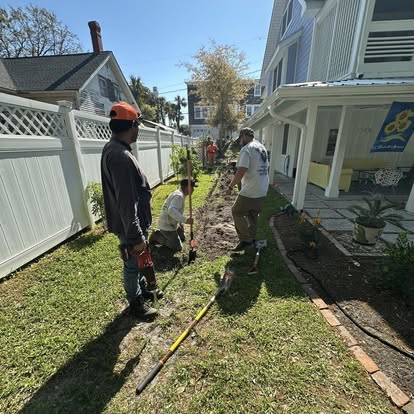
Eco-Friendly Irrigation Practices for Sustainable Landscaping Aug 18, 2025
One of the fundamental aspects of sustainable landscaping is efficient water management. This involves using water responsibly and ensuring that plants receive just the right amount of moisture, no more, no less. Implementing a well-designed irrigation system can significantly reduce water waste. Drip irrigation, for instance, delivers water directly to a plant's roots, maximizing absorption while minimizing runoff and evaporation. This method ensures water is used judiciously and plant health is optimized.
Smart irrigation controllers can also play a vital role in eco-friendly landscaping. These devices adjust watering schedules based on weather conditions, soil moisture, and plant needs, reducing unnecessary water use. By linking your irrigation system to a smart controller, you ensure your garden receives optimal hydration even during unexpected weather changes.
An often-overlooked aspect of sustainable landscaping is soil health. Healthy soil retains moisture better and supports robust plant growth. To enhance soil health, consider practices such as composting and using organic mulches. Compost improves soil structure and nutrient content, while mulch reduces evaporation, moderates soil temperature, and suppresses weeds. Both methods contribute to a thriving, low-maintenance landscape that requires less water.
Choosing the right plants is another crucial factor in creating an eco-friendly landscape. Opt for native plants adapted to your local climate and soil conditions. These plants typically require less water and maintenance, as they are naturally resilient to regional pests and diseases. Coastal Irrigation & Drainage can provide guidance on selecting indigenous flora that will thrive naturally, enhancing your garden's beauty without taxing water resources.
Rainwater harvesting is a sustainable practice worth considering. By collecting rainwater, you provide an alternative water source for irrigation, significantly reducing your reliance on municipal water supplies. Systems for rainwater harvesting can range from simple rain barrels to more sophisticated catchment systems, all contributing to a greener landscape.
Maintenance is another area where eco-friendly practices can be applied. Mulching not only benefits soil health but also reduces the frequency of watering. Regularly inspecting your irrigation systems for leaks or inefficiencies ensures water is being used effectively. These small actions accumulate to make a significant environmental impact.
Finally, educating yourself and others about sustainable practices is essential. Sharing knowledge about efficient water usage and eco-friendly landscaping with your community builds a collective effort towards a healthier planet. Encouraging such dialogue helps foster an understanding of sustainability's importance in our everyday actions.
In conclusion, by adopting eco-friendly irrigation practices, the customers of Coastal Irrigation & Drainage can enjoy lush, beautiful landscapes that contribute to environmental well-being. Implementing strategies like efficient water management, smart technology, soil health improvement, native plant selection, rainwater harvesting, and responsible maintenance creates a landscape that not only thrives but does so sustainably. As stewards of our environment, it's our responsibility to embrace these practices, ensuring a greener future for generations to come.
/filters:no_upscale()/filters:format(webp)/media/6842295f-caed-4647-94f2-d2375c215306.jpeg)